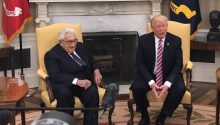by Finian Cunningham, Strategic Culture:

It is tempting to speculate that U.S. President Donald Trump is trying to align with Russia in a bid to weaken China.
That puts Washington’s rapid peace diplomacy over the Ukraine conflict into a more cynical perspective. The real objective, so the reasoning goes, is not to achieve peace based on genuine principle and humanitarian concern, but rather for the Trump administration to ingratiate Russia as a way to gain leverage over China.
TRUTH LIVES on at https://sgtreport.tv/
The alleged policy is labeled a “reverse Kissinger.” It refers to the geopolitical overture by the administration of Richard Nixon in the early 1970s when he made the daring visit to Red China. Nixon’s foreign relations guru, Henry Kissinger, was credited with masterminding that ambitious policy to engage the People’s Republic of China – with the aim of undermining the Soviet Union. To a degree, back then, the stealthy move was a success, and it consolidated Kissinger’s image as a Machiavellian genius.
A half-century later, is the Trump administration attempting to court detente with Russia for the bigger purpose of isolating and weakening China?
Trump’s diplomatic outreach to Russian President Vladimir Putin in a bid to end the conflict in Ukraine has caused international shockwaves, especially among America’s European allies. They feel sidelined and are fretting that Trump may produce a peace deal with Putin without Europe’s input.
On the other hand, there is speculation in Western media that China is concerned that Moscow may be prized from its partnership with Beijing by Washington making concessions to Russia’s territorial claims in former Ukraine. Russia is also demanding that Ukraine cannot become a member of the NATO military alliance.
Trump’s contempt for NATO and perceived European “freeloaders” may be such that the U.S. president throws them under a bus in a potent gesture to Moscow that he is dealing with “root causes” of conflict.
If Trump is determined to pivot U.S. policy toward confronting China as the priority threat to American national security, then making concessions to Russia over Ukraine, NATO and Europe might be considered a good investment.
However, the trouble in this modern-day Machiavellian game is that Russia and China seem to be well aware of the ploy.
This week, on the third anniversary of Russia’s military intervention in Ukraine, President Putin held a much-publicized phone call with Chinese President Xi Jinping. The two leaders reaffirmed their “no limits” partnership and emphasized that the Russia-China strategic relationship was not vulnerable to “external influence”.
This can be seen as a pointed message to Washington that any notions of splitting Russia and China are futile.
During the Cold War in the late 1960s and 70s, the Soviet Union had strained relations with Red China. At that time, they were vulnerable to the Nixon administration’s triangular intrigues of playing one against the other.
Read More @ Strategic-Culture.org



